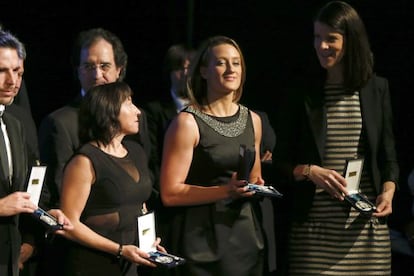Forever in second place
The ceremony for the latest recipients of the Royal Order of Sporting Merit only served to highlight Spain's continuing neglect of its female athletes

The ceremony last week to hand out the medals and plaques to the latest recipients of the Royal Order of Sporting Merit, which recognizes distinction in Spanish sport, turned into a tribute to the country's women athletes.
With an image in the background of former racing driver María de Villota, who died suddenly in Seville on October 11, the speeches grew passionate: "Today we are celebrating the success of Spanish women's sport," the Minister for Education, Culture and Sport José Ignacio Wert said proudly. "To aspire is a women's privilege," he said — a comment open to several interpretations. "But the women in Spanish sport are at a much higher stage than that of aspiring."
The secretary of state for sport, Miguel Cardenal, limited himself to commenting on the advance of Spanish sportswomen: "The world swimming championships in Barcelona were a brilliant showcase for women. It's not that we are seeing the men being pushed into the background. The sportswomen have responded with some stunning results," he said.
Alongside the higher-profile medals for female athletes this year, such as swimmers Mireia Belmonte and Melani Costa, and the Spanish women's basketball team, there have been many more: the world water polo gold; the two medals for the rhythmic gymnastics team at the world championships; the world bronze for weightlifter Lidia Valentín; motorcyclist Laia Sanz's world trials title, the 13th of her career...
Sportswomen have responded with some stunning results"
It was Sanz — recipient of the Royal Order of Sporting Merit gold medal — who was entrusted with giving thanks on behalf of all those honored at the ceremony. She, of course, took the occasion to remember María de Villota, and her determination to succeed in the man's world of Formula 1. "I would like to remember a sportswoman who wanted to fulfill a dream in a very difficult world," she said. "It is very hard to accept her loss. María, we will not forget you."
But behind all these well-intentioned and sincere words are some less praiseworthy numbers. Of the 189 recipients of the Royal Order of Sporting Merit this year — without counting clubs, federations and other organizations, which receive their honor in the form of a plaque - only 66 were women, just 34.9 percent.
What's more, as they do in many other fields, women in sport mostly receive the lowest honor, which in the case of the Royal Order is the bronze medal. Of the 102 bronze medalists this year, 37.3 percent were women: there you have world water polo gold medalist Jennifer Pareja; Margalida Crespí, winner of five synchronized swimming medals at the World Aquatics Championships in Barcelona; and Marta Figueras-Dotti, one of the pioneers of women's professional golf in Spain.
Moving up the podium, there were 20 female silver medalists — 36.6 percent of the total. But it is the gold medal category that has the greatest imbalance. Only eight of the 32 recipients of the highest distinction were women: Laia Sanz; Marina Alabau, Olympic windsurf gold medalist; Michelle Alonso, a Paralympic swimming gold medalist; Andrea Fuentes, four-times Olympic synchronized swimming medalist; Tamara Echegoyen, Ángela Pumariega and Sofía Toro, Olympic sailing champions; and Matilde García Duarte, a state lawyer in former government sports chief Jaime Lissavetzksy’s team at the Higher Council for Sport.
At the same time, bearing in mind where Spanish sport is coming from, neither are these numbers devastating. It is enough to compare them with those of a couple of years ago. Then, just a year before the London Olympics validated the advance of women's sport in Spain, the proportion of Royal Order of Sporting Merit female recipients was not even 17 percent.
There might, therefore, be cause for optimism. But for now, just a bit.
Tu suscripción se está usando en otro dispositivo
¿Quieres añadir otro usuario a tu suscripción?
Si continúas leyendo en este dispositivo, no se podrá leer en el otro.
FlechaTu suscripción se está usando en otro dispositivo y solo puedes acceder a EL PAÍS desde un dispositivo a la vez.
Si quieres compartir tu cuenta, cambia tu suscripción a la modalidad Premium, así podrás añadir otro usuario. Cada uno accederá con su propia cuenta de email, lo que os permitirá personalizar vuestra experiencia en EL PAÍS.
¿Tienes una suscripción de empresa? Accede aquí para contratar más cuentas.
En el caso de no saber quién está usando tu cuenta, te recomendamos cambiar tu contraseña aquí.
Si decides continuar compartiendo tu cuenta, este mensaje se mostrará en tu dispositivo y en el de la otra persona que está usando tu cuenta de forma indefinida, afectando a tu experiencia de lectura. Puedes consultar aquí los términos y condiciones de la suscripción digital.









































